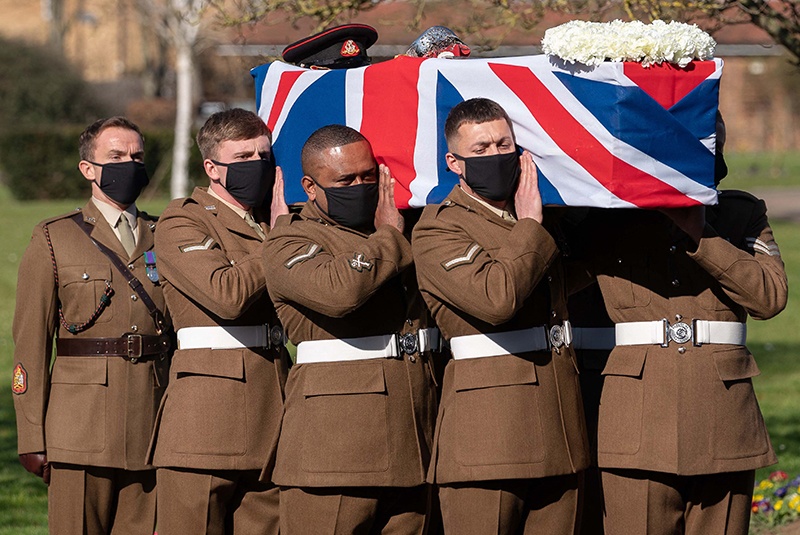LONDON: Britain said farewell yesterday to fundraising war veteran Captain Tom Moore who died from coronavirus earlier this month, as the US pushed forward with a massive recovery plan for its COVID-battered economy. A vast $1.9 trillion package - including $1,400 payouts to most Americans and billions of dollars to boost vaccine delivery, help schools reopen and fund local governments - was passed in the US House of Representatives and will now move to the Senate.
"After 12 months of death and despair, the American recovery begins tonight," congressman Brendan Boyle told the House, just days after the US death toll surpassed 500,000. The bill is on track to be the second largest US stimulus ever, illustrating the huge effort needed to tackle the multiple crises unleashed by a pandemic that has killed more than 2.5 million worldwide.
Europeans continue to live under some of the world's toughest restrictions, and in France they just got tougher. Two cities - Dunkirk in the north and Nice in the south - locked down on the weekends to halt the spread. "We have to do something as Covid is getting worse in the region," Charlie Kentish, a British resident taking an early morning walk in Nice, told AFP. He was resigned to spending his weekends playing video games with his teenage children.
From Brazil to the Czech Republic, restrictions are being reimposed and tightened. Even in relatively unscathed New Zealand, the biggest city Auckland was thrust back into lockdown on Saturday shortly after a three-day shutdown ended. A small cluster has been linked to a school, but the country's caseload still pales in comparison with the numbers seen in Europe and the Americas.
In Britain, 100-year-old Tom Moore helped lift the COVID-induced gloom last year by staging fundraising events including completing 100 lengths of his back garden using a walking frame. After his campaign went viral, he raised nearly £33 million ($45 million) for healthcare charities, and was knighted for his efforts. His funeral, a small family ceremony, was shown live on national television and he was honored with a flypast of a World War II plane.
The rollout of vaccines has improved the prospects greatly for many older people, with Britain excelling in its distribution to vulnerable groups. But the campaign has not gone smoothly everywhere, with campaigners in Canada appealing for their loved ones to get the jab quickly. "I am 94 today! No gifts, just the vaccine please," reads a handwritten sign outside the Toronto home of Nina Rockett. Her daughter Margot has become frustrated with the relatively slow pace of Canada's rollout. "I think everybody should hang a banner like this outside their door or window or balcony," she said.
The virus has not spared younger people either. There is growing concern over cases of "long COVID", where people suffer symptoms for months after the initial illness. Areli Torres, a 31-year-old engineer from Mexico, told AFP she fell ill for a few days last June, but months later she is still suffering symptoms including numbness in parts of her body. "Everything's uncertain. Everything's been an ordeal. I've seen four doctors," she said. It had taken seven months just to get the correct diagnosis, she added.
The World Health Organization this week urged governments to prioritize understanding the long-term effects of infections. As the health effects linger, so does the fallout for cultural events. The pandemic has torpedoed the whirlwind of glitzy Los Angeles parties that normally marks the start of the Hollywood awards season.
While the famous Sunset Strip is adorned with its usual giant "For Your Consideration" movie billboards, voters are watching nominated films from home, and journalists are interviewing actors on their laptops. Variety awards editor Tim Gray told AFP he had not been to a single in-person event for a film this year. "Everyone's just had to adapt," added The Hollywood Reporter's awards columnist Scott Feinberg. — AFP



